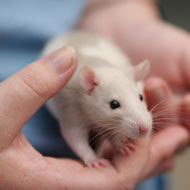Rat owners warned of infection risk

Rat bite fever (RBF) can be fatal in humans and is mainly caused by S. moniliformis.
US health experts have urged caution for rodent owners and handlers in a new report on the risk factors for Streptobacillus moniliformis.
Rat bite fever (RBF) in humans is mainly caused by S. moniliformis. According to a team of researchers led by Jessica Adam from the Centers for Disease Control and Prevention (CDC), there were 17 reported cases of RBF in San Diego between 2000 and 2012. Of these cases, 94 per cent were linked to pets.
Research suggests almost all domestic and wild rats carry S. moniliformis. Humans can become infected through rodent bites, scratches, handling or ingesting contaminated food or water. It is thought around 10 per cent of bites may cause infection.
Of the 17 reported cases in San Diego, 44 per cent of patients had handled a rat, 38 per cent had been bitten and 13 per cent had been scratched. The median patient age was 10 years.
In the report, published in CDC's journal Morbidity and Mortality, researchers describe a fatal case of RBF in a 10-year-old boy last year.
The previously healthy patient experienced vomiting, headaches and leg pain, with a temperature of 102.6ºF (39.2ºC). During the next 24 hours, the patient experienced vomiting, a persistent fever, confusion and weakness, before he collapsed at home. Resuscitation attempts by paramedics were unsuccessful.
Lung, liver and epiglottis tissue samples collected post-mortem tested positive for S. moniliformis.
The patient owned one pet rat and had obtained a second in the 10 days before his death. Polymerase chain reaction testing of this rat detected S. moniliformis. The first rat, however, tested negative. The autopsy report noted the patient had been scratched by his pet rats.
Authors of the report say RBF should be considered in patients with a rash, fever and joint pain when they have a history of rodent exposure. While rare, RBF can be fatal in about 13 per cent of untreated cases.
Rat owners are urged to wear gloves, avoid rat secretions and wash hands thoroughly after handling rats or cleaning their cage. Prompt medical care should be sought for those experiencing RBF symptoms after contact with rats.
For the full report, visit CDC's website: http://www.cdc.gov/mmwr/preview/mmwrhtml/mm6350a8.htm?s_cid=mm6350a8_w



 The RCVS has announced a new version of its 1CPD mobile app, with enhanced features for veterinary surgeons and veterinary nurses to record their continuing professional development.
The RCVS has announced a new version of its 1CPD mobile app, with enhanced features for veterinary surgeons and veterinary nurses to record their continuing professional development.